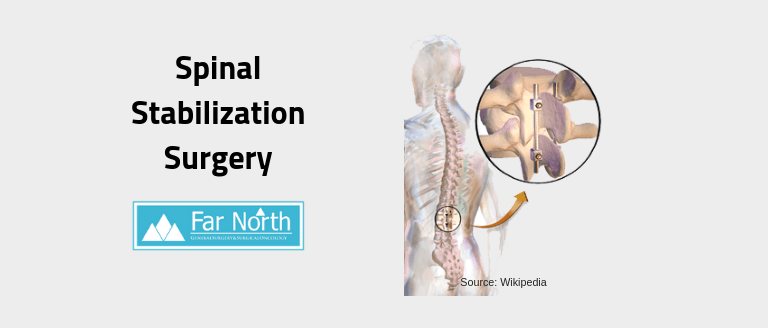Spinal stabilization becomes necessary to treat a number of spine conditions. The degree of stabilization required depends on the severity of the problem and the assessment done by your surgeon. Spinal stabilization surgery involves inserting instruments such as screws and plates in the back of your spine to stabilize it and facilitate fusion after decompression.
Why You Would Need Spinal Stabilization Surgery
Spinal stabilization surgery is used to treat the following conditions: - Trauma from an auto or sports-related injury
- Trauma due to falling from a high place, resulting in spinal compression, fractures, and other conditions
- Degenerative conditions such as scoliosis and herniated discs
- Spinal fractures from bone loss due to osteoporosis
- Spondylolisthesis
- Spinal tumors
What Is Spinal Cord Stabilization?
Spinal cord stabilization involves surgical stabilization procedures that are used to treat acute spinal cord injuries. Stabilization of the spinal cord is a surgical procedure in which bone fragments are removed, and the alignment of the vertebrae is restored.
What Happens in Spinal Stabilization Surgery
Different surgical procedures are used to stabilize your spine. A common surgery involves instrumentation. Your surgeon will use hardware such as facet screws, percutaneous pedicle screws, and spinous process plates to fuse the backbones together. Spinal instrumentation is done along with decompression which is a minimally invasive procedure performed to take pressure off the spinal cord or nerve roots.
[Also Read: Difference Between Major and Minor Surgery] Before inserting the hardware, your surgeon will remove the part of the spine that is pressing on the nerves. After this, a fusion is done in which the surgeon puts in irradiated cadaver bone secured with rods, screws, and plates that hold everything together till the time the patient’s bone and bone graft fuse together.
Minimally Invasive Spine Stabilization Surgery
Minimally invasive stabilization procedures offer a safe and effective treatment option for most spinal conditions. In the minimally invasive procedure, stabilization of the spine is performed through a small incision without damaging or cutting the surrounding muscles. A special X-ray guides the surgeon throughout the procedure. A tabular dilator is used to access the spine between the muscles. Retractors help keep the space open during the procedure. Special implants are then placed to fuse two or more vertebrae together.
How Long Does It Take to Recover from Spinal Stabilization Surgery?
The pain will subside in four weeks after the procedure. However, there will be some pain over several months. Limited activity is allowed and there should be no lifting, bending and twisting while the bones fuse together. Physical therapy will start in the first week after the surgery with walking and stretching followed by static stabilization exercises for the next two months. It takes around six months to fully recover from spinal stabilization surgery. At
Far North Surgery, our surgeon,
Dr. Prasad, has the experience and expertise in treating several spine conditions through appropriate and effective spinal stabilization procedures. We use the latest and safest surgical methods to help you restore function and mobility to help improve your quality of life.
Call us at 907-276-3676 to get the best treatment option or answer of
any questions you may have.  Want to download the registration form? Click here.
Want to download the registration form? Click here.



 Want to download the registration form? Click here.
Want to download the registration form? Click here.